by Valerie Mendez Stansly | Mar 21, 2024
Setting off on a paddling adventure with youth, whether it involves canoeing, kayaking, or stand-up paddleboarding (SUP), offers a wonderful opportunity for them to get active, connect with the outdoors, and learn the value of teamwork. These activities can leave a lasting impression on the young people involved, fostering feelings of accomplishment, resilience, and fellowship. However, the responsibility on the adults leading these trips is significant. Ensuring a safe, educational, and enjoyable experience requires meticulous planning, a focus on safety, and a commitment to engaging each participant. Through this blog series, you will be provided with the insights and tools necessary to organize a successful paddling event for youth.
Securing Kayaks
Safety is the foundation of any successful paddling adventure, especially when involving young people. A critical, yet often overlooked, aspect of this safety is the secure transportation of your kayaks. Begin by firmly attaching your kayaks to your trailer using suitable straps. Before hitting the road, double-check that the straps are tightly fastened, the ends are securely tied off, and the kayak doesn’t move when you gently rock it.
When loading a kayak, always position the straps in advance. It’s a team effort to safely lift the kayak by its bow (front) and stern (back) handles—remembering to bend at the knees to protect your back. Once the kayak is evenly placed on the trailer’s crossbars, secure it properly by using the appropriate ties. Although ratcheting straps are commonly used, they can potentially damage your kayak due to excessive pressure. As an alternative, the use of buckle bumper straps offers a safe and user-friendly solution for both novices and experienced paddlers alike. Ensuring your kayaks are safely secured not only protects your equipment but also ensures the safety of everyone on the road.
Planning is Essential – Crafting a Float Plan
The backbone of a smooth paddling adventure is a detailed float plan. This document should outline your route, expected weather conditions, participant list with emergency contacts, and a timeline of the trip. Utilizing resources such as the Coast Guard Float Plan Central website ensures you don’t miss any critical planning steps. Your float plan should include not only the basics but also specific details such as the equipment each person will bring, health forms, expected departure and return times, access points, and the driving route. It’s also vital to assess and document the day’s weather, tides, water flow, and temperature, alongside local regulations, necessary permits, and the nearest emergency services and outfitters.
In addition to creating a comprehensive float plan, it’s essential to pack necessary items like water, snacks, sunscreen, and first-aid supplies, while encouraging lightweight packing to minimize the physical load on paddlers. Ensure that agents and other adults in charge involved are well-informed about the float plan, current and forecasted weather conditions, and the personal skills and comfort levels within the group.
Remember, the float plan is not just a list; it’s a snapshot of your group’s capabilities, equipment, and safety resources. Items not directly related to trip planning and participant safety should be recorded separately. Always leave the float plan with someone on shore who is familiar with the trip details, participants, and local area. This person’s responsibility is to alert local authorities should the group not return as scheduled. Typically, float plans are best entrusted to an agent and/or county extension director.
When you are out on the water, pay close attention to changing weather conditions. If the weather gets challenging, ensure your group stays together and maintains steady communication. In the case of unexpected thunder, lightning, heavy rain, or strong wind, find a protected area on land for the group to escape the elements. If the group gets off the water, be sure that boats or boards are far away from the water’s edge. Make sure to take all paddles and any food, water, and personal gear are with youth.
Choosing the Right Gear
Personal gear and preparedness are crucial for the success of your paddling trip. When choosing a paddling outfit, prioritize versatility, durability, and protection against cold, and wet conditions. Here are some key guidelines:
- Personal Flotation Device (PFD): Always wear a PFD while on the water. Ensure it fits snugly without riding up over your face or head. If adjustments are needed, do so safely onshore.
- Temperature Considerations: Youth and adults should dress for potential immersion. Hypothermia, a dangerous drop in body temperature, can occur in water temperatures as “warm” as 70 degrees Fahrenheit, according to U.S. Coast Guard. Conversely, hyperthermia results from overheating, often due to hot, humid conditions. Dressing in layers will help adjust for body temperature changes during the trip.
- Sun Protection: Applying sunscreen is critical for preventing sunburn and overheating, even on cloudy days. Due to the reflective nature of water, apply sunscreen often. Mineral sunscreen, with zinc oxide or titanium dioxide, forms a barrier against UV rays with a reduce risk of irritation or allergic reaction and is favored by many paddlers.
- Avoid cotton and restrictive clothing: Steer clear of cotton clothing such as jeans and hoodies, which retain water when wet. Instead choose garments made from quick-drying, moisture-wicking synthetics, or wool, which provide insulation even when wet. Fortunately, outfitting yourself appropriately doesn’t have to break the bank—many of these items can be readily found at affordable prices in secondhand stores like Goodwill.
By following safety guidelines and preparing with the right gear, paddlers can enjoy a safe and comfortable experience on the water, ready to face varying temperatures and conditions with confidence. In the next blog, we will discuss group management and safety considerations to take while on the water.
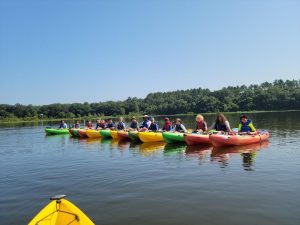
Introducing youth to the joys of paddling can create unforgettable memories that last a lifetime. At the same time, it’s crucial that we, as adults, prioritize their safety above all.
Resources:
Want to learn more? Check out Paddle TV on YouTube which has made great videos in partnership with the American Canoe Association (ACA) by following this link: https://americancanoe.org/education/youth-paddling-development/educational-videos/
Consider using the Paddle Safe Paddle Smart (PS2) curriculum that has been created by ACA when implementing a paddling component during day camps or workshops.
by lauenc | Feb 5, 2024
Hunting, when approached responsibly, can be a rewarding and educational experience for young individuals. As a 4-H agent dedicated to fostering a love for the outdoors, I recognize the importance of instilling a strong foundation of ethics and safety when introducing youth to the world of hunting. To ensure a positive and educational introduction to this amazing tradition, several key considerations should be considered.
- Safety Training and Ethical Hunting Practices:
The Florida Fish and Wildlife Conservation Commission (FWC) offers comprehensive safety resources, emphasizing the importance of proper firearm handling, wildlife identification, and safe hunting practices. Educating young hunters about the critical role of safety protocols ensures a secure and enjoyable experience in the field. There are a variety of hunter safety courses available. Visit the Which Hunter Safety Course Is Right For You? | FWC (myfwc.com) webpage to find out what course to see what may work best for your family. If you have completed an online course and have a certificate, you can participate in the upcoming Field Day on November 18, 2023 at West Pittman Baptist Church in Holmes County. Visit the Hunter Safety Registration (site.com) webpage to register or find other courses in your area on a different date.
- First Shot Fundamentals:
Holmes County 4-H has been awarded several grants from the The National Rifle Association (NRA) Foundation. Our Holmes County 4-H Shooting Sports Program includes archery, rifle, and shotgun disciplines. Youth members learn “first shot fundamentals” that will translate to important life skills as they may choose to ultimately participate in hunting opportunities. Emphasizing the values of fair chase, respect for wildlife, and the importance of humane and responsible harvesting helps instill a deep appreciation for the natural world and ecosystem.
- Conservation Education:
Collaborating with 4-H programs that incorporate conservation education can help young hunters understand the vital role they play in wildlife conservation and habitat preservation. Teaching the principles of sustainable hunting and the importance of maintaining ecological balance contributes to the development of environmentally conscious and responsible hunters. This also includes ongoing education and research related to Chronic Wasting Disease (CWD) in Holmes County and the surrounding region to learn what we, as hunters, can do to help.
- Mentorship Programs:
The Florida Fish & Wildlife Conservation Commission often organizes mentorship programs that pair experienced hunters with newcomers. These programs, align with 4-H’s emphasis on positive youth development and foster a supportive learning environment. Mentors follow the guidance outlined in mentorship materials to provide hands-on training, impart valuable skills, and promote the development of strong ethical values in young hunters. Visit the Mentored Hunts Registration (site.com) webpage to find upcoming opportunities across the state of Florida.
- Legal Compliance and Regulations:
The Florida Fish and Wildlife Conservation Commission (FWC) provides up-to-date information on hunting regulations, licensing requirements, and seasonal restrictions. Educating youth about these regulations instills a sense of responsibility and legal compliance, contributing to the cultivation of law-abiding and conscientious hunters.
By integrating these considerations into the process of introducing youth to hunting, we can ensure that they develop not only a passion for the sport, but also a respect for wildlife and the natural world. Together, we can foster the next generation of responsible and ethical hunters who prioritize safety, conservation, and ethical hunting practices in their outdoor adventures. For more information about how your youth can get involved with Holmes County 4-H, visit the Holmes County 4-H (holmescounty4h.com) webpage.
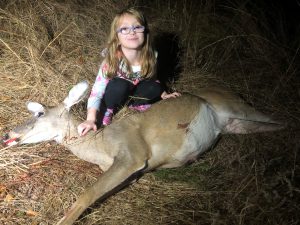
Miah, daughter of the Holmes 4-H Agent, enjoys the opportunity to harvest her first deer at age 6.
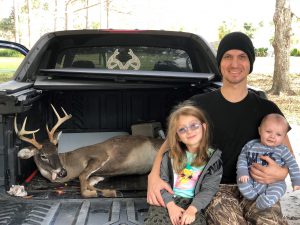
Holmes County 4-H Agent, Chris Lauen, introduces his children to a Holmes County whitetail buck.
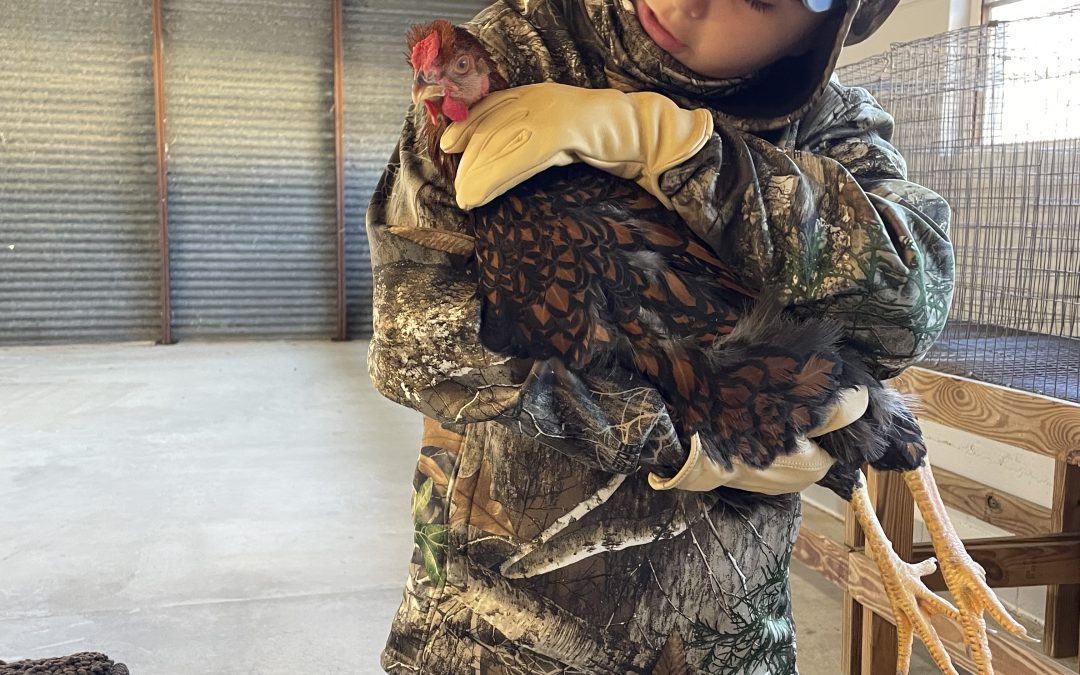
by Prudence Caskey | Jan 11, 2024
As we enjoyed a beautiful Christmas day in the panhandle, we need to start to brace for some colder weather as we welcome the new year. Here are a few ideas on how to protect your animals in the colder weather. During this upcoming cold snap, your “critters” will rely on you to survive it. As you think about how to best protect your outside pets and livestock, remember the three W’s. (more…)
by Valerie Mendez Stansly | Nov 17, 2023
Agriculture plays an important role in our society, yet a noticeable gap in understanding and engaging with this sector is evident among youth. Often, this disconnect stems from misconceptions about agriculture and the vast career opportunities it offers. Addressing these challenges requires long-term educational efforts that provide youth with hands-on experiences in the form of field excursions to increase interest and participation in Agriscience topics. The Ag Adventures program, an annual venture between UF/IFAS North Florida Research and Education Center (NFREC) and Florida 4-H, was created in response to this need. It aims to immerse students in the diverse and rich world of agriculture through experiential learning.
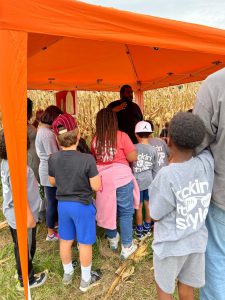
Ag Adventures connects youth from urban and rural areas to a large-scale farming research center, offering a firsthand look at agriscience topics in action.
Program Overview
For years, Ag Adventures has been actively engaging 4th and 5th graders from counties across the Panhandle. This program introduces students to several key subfields in agriculture, with an emphasis on sustainability:
- Soil Science: Students learn about the critical role of soil in natural ecosystems and agriculture. Hands-on experiences, such as exploring a soil pit, help youth gain a deeper understanding of soil science topics.
- Agricultural Technology: Students explore the latest innovations in precision agriculture, including drones and sensor technology, and their role in promoting sustainability and economic growth.
- Entomology: Focusing on the vital role of pollinators, students learn about the impact of insects on the ecosystem and our food supply. Field activities, like insect collecting, offer practical understanding of the importance of these animals and the need to protect them.
- Agronomy: By learning about crops such as corn, cotton, and peanuts, students gain insights into the economic and historical significance of agriculture in North Florida. Through this section, researchers and agents are able to showcases the diversity and complexity of plant science in a tangible way.
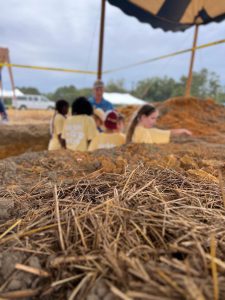
Students explore a soil pit, uncovering the hidden wonders of soil science and gaining hands-on insight into soil formation in our region.
Benefits of Field Excursions
Engagement in programs like Ag Adventures offers a multitude of benefits, equipping students with valuable insights and experiences that go beyond the traditional classroom. Such field excursions are important for:
- Strengthening STEM Appreciation: By contextualizing STEM concepts within the framework of agriculture, Ag Adventures bridges the gap between classroom learning and its practical applications. This approach not only enriches students’ understanding of STEM but can also spark their curiosity about agriscience.
- Facilitating Career Exploration: Ag Adventures provides a platform for youth to explore various careers in STEM. Through interactive experiences and exposure to academic pathways, the program demystifies agriculture, making it more accessible and relatable. This engagement broadens their career horizons and helps them envision a future where they can apply their learning in diverse ways.
- Bridging the Urban-Rural Divide: Ag Adventures offers youth from all backgrounds a chance to experience large-scale farming firsthand. By connecting youth directly with the source of their food, the program fosters a deeper appreciation for agricultural contributions and the interdependence between urban and rural communities.
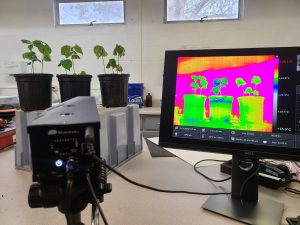
Ag Adventures enables young learners to engage with faculty members and discover cutting-edge agricultural research. For example, NFREC researchers demonstrate the use of thermal imaging technology to detect drought stress in crops, showcasing practical applications of science in farming.
Conclusion
The Ag Adventures program enhances the educational experience of 4th and 5th graders by merging classroom learning with real-world agricultural practices. This initiative by UF/IFAS Extension deepens their appreciation for STEM, opens new avenues for career exploration, and introduces them to the unique aspects of rural life and agriculture. We hope students develop a more comprehensive understanding of the world, laying the foundation for them to become informed and engaged members of society.
This program occurs annually in the fall. If you are interested in your school participating, please contact your local UF/IFAS Extension office.
References:
Behrendt, M., & Franklin, T. (2014). A review of research on school field trips and their value in education. International Journal of Environmental and Science Education, 9(3), 235-245.
Jean-Philippe, S., Richards, J., Gwinn, K., & Beyl, C. (2017). Urban youth perceptions of agriculture. Journal of Youth Development, 12(3). https://doi.org/10.5195/jyd.2017.497
by Heather Kent | Sep 7, 2023
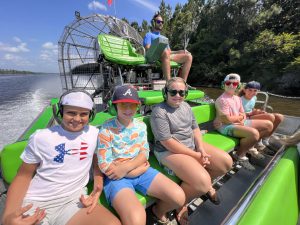
4-H youth explored different Florida habitats to learn about species.
Thanks to Fish Florida, 4-H youth across the panhandle are exploring their sparks related to fishing and Florida’s natural resources. Fish Florida supports organizations like 4-H that teach people, especially children, about Florida’s fish and aquatic habitats through donations of fishing equipment, grants, and scholarships. Their mission is to promote public awareness of and encourage the protection of marine fisheries and coastal habitats through non-formal education. Because their mission aligns so well with the mission of Florida 4-H, this partnership has been very successful.
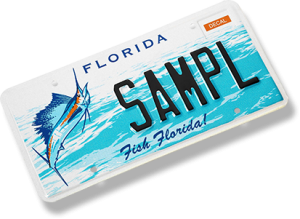
Fish Florida grants are supported through the sales of specialty tags.
Six Florida panhandle counties received equipment and funds to support 4-H fishing clubs and day camps, reaching 43 adult volunteers and nearly 200 youth. Through these programs, 4-H faculty, staff, and volunteers taught young people about different types of fishing equipment, how to rig a rod and reel, how to cast, how to tie different types of fishing knots, how to identify Florida fresh and saltwater fish, how to fish ethically (following Florida Fish and Wildlife regulations), water and boating safety, and more.
One 4-H youth shared, “I always enjoyed going fishing before, but now I understand what types of equipment and bait I need to use to catch the type of fish I like to catch. This program has also helped me understand why we have certain regulations to protect Florida habitats.”
Youth participating in the 4-H sportfishing program had the opportunity to visit a variety of Florida habitats to learn about different fish, including salt water, brackish water, and freshwater. They also met with professionals in the fishing and wildlife industries to learn about potential careers related to the fishing industry, as well as conserving Florida’s unique natural habitats. This program would not have been possible without the support from Fish Florida, which is funded through the sales of the Florida Sailfish specialty license plate.
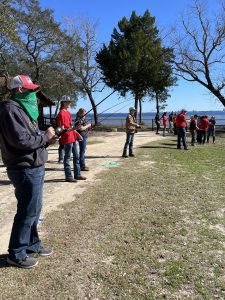
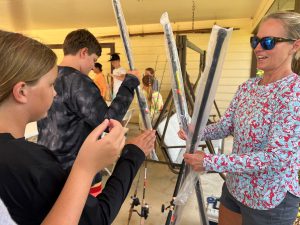
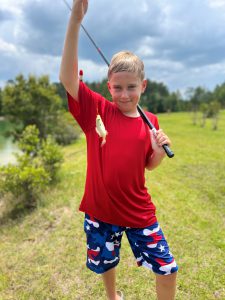
4-H programs in Florida’s panhandle provide several ways for youth to explore their interests related to fishing and the outdoors:
- Clubs- Youth can participate in 4-H clubs that are focused on fishing, natural resources, and the outdoors (shooting sports, ATV safety, camping). Clubs are the foundation of 4-H. A 4-H club is a group of five or more youngsters guided by one or more adults. A club can be any size–from a small group of kids from the same neighborhood to a large group of youth from within the county. Clubs typically meet at least once a month to participate in activities to learn more about a topic. These activities might include games, field trips, guest speakers, and contests. To learn more about what a 4-H club is, visit our website.
- Day Camps– Many counties offer day camps focused on fishing and the outdoors. These are typically held during the summer months, or on non-school days. Day camps are a great way for youth who are new to 4-H to get a feel for what 4-H offers.
- Residential Camps– 4-H Camp Timpoochee in Niceville, FL offers residential camps to help youth explore Florida’s environments. This camp is the oldest 4-H camp in Florida and is located on the Choctwhathatchee Bay.
- School Programs– Counties offer a variety of programs through the schools to support non-formal learning. One of these programs is the Florida Youth Naturalists. The Florida Youth Naturalists program guides youth through an exploration of Florida’s uplands, wetlands, and coastal ecosystems and was inspired by the Master Naturalist Program, which is targeted toward adults.
- Contests– Youth can also participate in contests related to the fields of conservation and ecology such as the 4-H Wildlife Ecology Contest at the North Florida Fair. Activities and study guides to prepare for 4-H Wildlife Ecology can be found online. The deadline to register for the 4-H Wildlife Ecology Contest is October 13. Another contest related to outdoor education is the 4-H Forest Ecology Contest. A clinic to prepare for the State 4-H Forest Ecology Contest will be held on October 14th, and the deadline to register for the clinic is September 23 in 4HOnline.
Check out our 4-H Sportfishing Project Page to learn more about our programs related to fishing. To learn more about Fish Florida, or how you can support them through the Sailfish License Plate program, visit their website. To learn more about opportunities for you to share your passion for fishing with the next generation, or to get your child involved, contact your local UF IFAS County Extension Office.
by Prudence Caskey | Aug 31, 2023
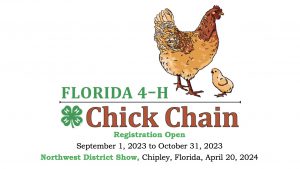
Who can participate in the NW District Chick Chain Project?
4-H Youth ages 5-18 from the Northwest District of Florida can enroll and participate in the NW Florida 4-H Chick Chain project. Those counties include Bay, Calhoun, Escambia, Franklin, Gadsden, Gulf, Holmes, Jackson, Jefferson, Leon, Liberty, Okaloosa, Santa Rosa, Wakulla, Walton, and Washington.
What is the Chick Chain project?
Join 4-Hers from our 16-county Northwest Extension district and learn how to raise and care for chickens. At the end of the project, there’s a district show where you’ll show off your birds and everything you’ve learned. This website will support you throughout your project. (more…)












